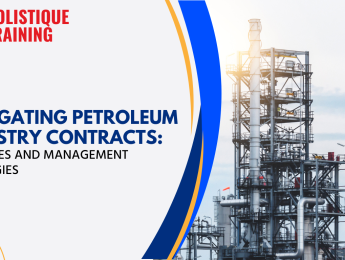- Table of Contents
- Introduction
- Exploration and Production Contracts
- Drilling and Development Contracts
- Transportation and Infrastructure Contracts
- Supply and Purchase Contracts
- Operational and Maintenance Contracts
- Risk Management and Insurance Contracts
- Regulatory and Compliance Contracts
- Future Trends in Petroleum Industry Contracts
Introduction
In the petroleum industry, contracts are the backbone of operational, financial, and legal arrangements, ensuring smooth and effective exploration, production, and transportation management. The diverse range of contract types—including exploration and production agreements, drilling and development contracts, and transportation and infrastructure deals—is crucial in defining the relationships between stakeholders, allocating risks, and establishing performance expectations. These contractual agreements are essential for mitigating risks, managing resources efficiently, and ensuring compliance with regulatory standards. As the industry evolves, understanding and effectively managing these contracts is vital for achieving operational success and maintaining financial stability in a dynamic and complex sector.
Exploration and Production Contracts
Exploration and production contracts are pivotal in the petroleum industry, serving as the foundational agreements that govern the initial phases of oil and gas ventures. These contracts are designed to outline the roles, responsibilities, and financial arrangements between parties involved in the exploration and development of hydrocarbon resources. The most common types include Joint Operating Agreements (JOAs), Production Sharing Contracts (PSCs), Service Contracts, and Farm-in and Farm-out Agreements. JOAs are typically used to manage the operations of joint ventures where multiple companies collaborate on exploration and production activities, sharing costs and revenues according to predetermined ratios. PSCs, on the other hand, involve a partnership where the host government or national oil company retains ownership of the resources, and the contractor is compensated through a share of the production. Service Contracts assign specific tasks, such as drilling or technical services, to contractors who are paid based on the work performed rather than a share of production. Farm-in and Farm-out Agreements allow companies to transfer interests in exploration blocks, providing opportunities for collaboration or investment shifts. These contracts are critical for mitigating risks, aligning interests, and ensuring the efficient development of petroleum resources.
- Joint Operating Agreements (JOAs): Govern joint ventures, defining roles, responsibilities, and financial shares.
- Production Sharing Contracts (PSCs): Allow contractors to recover costs and receive a share of production, while the host country retains ownership.
- Service Contracts: Focus on specific services like drilling or technical support, with compensation based on work performed.
- Farm-in and Farm-out Agreements: Facilitate the transfer of exploration interests between companies, enabling strategic adjustments and collaborations.
Drilling and Development Contracts
Drilling and development contracts are essential for the successful execution and management of drilling operations and the subsequent development of petroleum resources. These agreements outline the terms under which drilling and development activities are carried out, focusing on the responsibilities, costs, and technical specifications involved. Drilling contracts are typically established between the operator and drilling contractors, detailing the scope of work, equipment requirements, and performance standards. These contracts ensure that drilling operations are conducted efficiently, safely, and within budget. Development and construction contracts cover the design, procurement, and construction of facilities necessary to extract and process hydrocarbons. Engineering, Procurement, and Construction (EPC) contracts are common, where the contractor is responsible for the entire project lifecycle, including engineering design, procurement of materials, and construction of facilities. These contracts are crucial for managing the complexity and scale of development projects, ensuring they meet technical specifications and regulatory requirements. Effective drilling and development contracts help mitigate operational risks, control costs, and enhance project outcomes by clearly defining the roles and expectations of all parties involved.
- Drilling Contracts: Specify the terms for drilling operations, including equipment, performance standards, and compensation.
- Development and Construction Contracts: Outline the requirements for building facilities and infrastructure necessary for resource extraction.
- Engineering, Procurement, and Construction (EPC) Contracts: Cover the complete project lifecycle, including design, procurement, and construction responsibilities.
- Risk Management and Performance Metrics: Address operational risks, performance indicators, and compliance with industry standards.
Transportation and Infrastructure Contracts
Transportation and infrastructure contracts are vital components of the petroleum industry, focusing on the logistics and infrastructure needed to move and store hydrocarbons from production sites to end-users. These contracts address the agreements between operators and service providers responsible for transporting and handling petroleum products. Transportation agreements specify the terms for moving crude oil, natural gas, and refined products via pipelines, rail, or marine vessels. These contracts detail the responsibilities for constructing, operating, and maintaining transportation infrastructure, including pipeline capacity, delivery schedules, and tariff structures. Pipeline contracts, a subset of transportation agreements, involve constructing and operating pipelines that transport oil and gas over long distances. These contracts often include capacity, safety standards, and regulatory compliance provisions. Storage and terminal agreements focus on the facilities that store and handle petroleum products before distributing them to the market. These contracts cover aspects such as storage capacity, handling procedures, and operational standards. Efficient management of these contracts is crucial for maintaining the flow of products, ensuring infrastructure reliability, and complying with regulatory requirements.
- Transportation Agreements: Define terms for moving petroleum products via pipelines, rail, or marine vessels, including capacity and tariffs.
- Pipeline Contracts: Detail the construction, operation, and maintenance of pipelines, including safety and compliance requirements.
- Storage and Terminal Agreements: Cover the operation and management of storage facilities and terminals, including capacity, handling procedures, and operational standards.
- Infrastructure Management: Ensure the reliability and efficiency of transportation and storage systems, addressing maintenance, upgrades, and regulatory compliance.
Supply and Purchase Contracts
Supply and purchase contracts are integral to the petroleum industry, governing the terms under which crude oil, natural gas, and refined products are bought and sold. These contracts define the relationships between suppliers and buyers, ensuring clarity on petroleum products' delivery, quality, and pricing. Crude oil supply contracts establish the terms for selling raw oil from producers to refineries or traders. These agreements often specify the quantity of oil, delivery schedules, and pricing mechanisms, including fixed prices, market-based pricing, or indexed pricing tied to global oil benchmarks. Gas supply agreements similarly govern the sale and delivery of natural gas, outlining the terms for volume, delivery points, and pricing. These contracts may also address long-term and short-term supply arrangements, providing flexibility to both buyers and sellers. The distinction between long-term and short-term contracts is important; long-term contracts typically offer stable pricing and supply security, while short-term contracts may provide more flexibility but can be subject to market volatility. Effective supply and purchase contracts are crucial for managing market risks, ensuring reliable supply chains, and achieving favourable commercial terms.
- Crude Oil Supply Contracts: Define terms for selling raw oil, including quantity, delivery schedules, and pricing mechanisms.
- Gas Supply Agreements: Govern the sale and delivery of natural gas, specifying volume, delivery points, and pricing terms.
- Long-Term vs. Short-Term Contracts: Address the stability of supply and pricing, with long-term contracts offering stability and short-term contracts providing flexibility.
- Pricing Mechanisms: Include fixed prices, market-based pricing, or indexed pricing based on global benchmarks.
- Market Risk Management: Facilitate risk management strategies to handle price fluctuations and supply uncertainties.
Operational and Maintenance Contracts
Operational and maintenance contracts are crucial for ensuring the efficient and effective functioning of petroleum industry assets, including drilling rigs, production facilities, and infrastructure. These contracts outline the terms for managing day-to-day operations and performing routine and preventive maintenance tasks. Maintenance service agreements are a key component detailing the responsibilities for routine upkeep, repair, and overhaul of equipment and facilities. These agreements often include schedules for regular inspections, preventative maintenance tasks, and response times for emergency repairs. On the other hand, operational support contracts focus on providing the necessary expertise and resources to manage and optimise daily operations. This can include everything from personnel to specialised equipment and technology. These contracts are essential for minimising downtime, maximising operational efficiency, and ensuring that equipment and facilities comply with industry standards and regulatory requirements. Proper management of operational and maintenance contracts helps to mitigate operational risks, extend the lifespan of assets, and ensure the continuous and reliable operation of petroleum facilities.
- Maintenance Service Agreements: Define responsibilities for routine upkeep, repairs, and overhauls of equipment and facilities, including schedules and emergency response times.
- Operational Support Contracts: Provide expertise and resources for managing daily operations, including personnel, technology, and specialised equipment.
- Preventive Maintenance: Focus on regular inspections and maintenance tasks to prevent equipment failures and extend asset lifespan.
- Compliance and Standards: Ensure maintenance and operational activities meet industry standards and regulatory requirements.
- Risk Mitigation: Help reduce operational risks and minimise downtime by effectively managing maintenance and operational processes.
Risk Management and Insurance Contracts
Risk management and insurance contracts are essential in the petroleum industry for mitigating and managing the various risks associated with exploration, production, and transportation activities. These contracts outline the allocation of risks and the mechanisms for addressing potential liabilities and losses. Risk allocation agreements detail how different risks, such as operational, environmental, and financial risks, are shared between parties involved in a project. These agreements help clarify each party's responsibilities and liabilities, reducing the potential for disputes and ensuring that risks are managed effectively. Insurance contracts provide financial protection against unforeseen events and accidents, such as equipment failure, environmental spills, or accidents during transportation. These contracts typically cover various types of insurance, including property, liability, and environmental liability insurance. Property insurance protects against damage to physical assets, while liability insurance covers legal claims and compensation costs resulting from third-party injuries or property damage. Environmental liability insurance specifically addresses the costs associated with environmental remediation and regulatory fines. Effective management of risk and insurance contracts is crucial for maintaining operational stability, ensuring regulatory compliance, and protecting against financial losses.
- Risk Allocation Agreements: Define how different risks, including operational, environmental, and financial risks, are distributed among parties.
- Insurance Contracts: Provide financial protection against various risks, including equipment failure, environmental spills, and transportation accidents.
- Property Insurance: Covers damage to physical assets and infrastructure.
- Liability Insurance: Addresses legal claims and compensation for third-party injuries or property damage.
- Environmental Liability Insurance: Focuses on costs associated with environmental remediation and regulatory fines.
- Regulatory Compliance: Ensures adherence to industry regulations and standards, reducing the risk of legal and financial repercussions.
Regulatory and Compliance Contracts
Regulatory and compliance contracts are vital in the petroleum industry to ensure that operations adhere to legal, environmental, and safety standards. These contracts define the obligations and responsibilities of parties to meet regulatory requirements and industry standards throughout the lifecycle of petroleum projects. Environmental compliance agreements are a key component, focusing on managing the environmental impacts of petroleum activities. These agreements outline measures for environmental protection, such as waste management, emission controls, and remediation plans for potential spills or leaks. Safety and health agreements address the measures required to ensure the safety and well-being of workers and communities. These contracts include provisions for safety training, equipment standards, and emergency response protocols. Compliance with local, national, and international regulations is critical for avoiding legal penalties and maintaining operational licenses. Regulatory compliance contracts often specify reporting requirements, audit procedures, and corrective actions for non-compliance. Effective management of these contracts helps mitigate legal risks, protect the environment, and ensure the safety of operations, ultimately supporting the sustainable and responsible development of petroleum resources.
- Environmental Compliance Agreements: Define measures for managing environmental impacts, including waste management, emission controls, and remediation plans.
- Safety and Health Agreements: Outline requirements for safety training, equipment standards, and emergency response protocols to protect workers and communities.
- Regulatory Compliance: Ensure adherence to local, national, and international regulations, including reporting requirements and audit procedures.
- Corrective Actions: Specify actions to address non-compliance issues and prevent future violations.
- Legal and Operational Risks: Mitigate risks associated with legal penalties and operational disruptions by maintaining compliance with regulatory standards.
Future Trends in Petroleum Industry Contracts
Future trends in petroleum industry contracts are shaped by evolving technological advancements, shifting market dynamics, and increasing emphasis on sustainability. As the industry navigates these changes, several key trends are emerging:
- Increased Focus on Sustainability: Contracts increasingly incorporate environmental and social governance (ESG) criteria, reflecting the industry's commitment to reducing its carbon footprint and promoting sustainable practices. Future contracts will likely include more stringent environmental impact assessment requirements, emissions reduction, and community engagement.
- Adoption of Digital Technologies: Integrating digital technologies, such as blockchain, artificial intelligence (AI), and data analytics, is transforming contract management. Blockchain can enhance transparency and reduce fraud, while AI can streamline contract drafting and compliance monitoring. Data analytics will provide deeper insights into contract performance and risk management.
- Flexibility and Adaptability: The volatility of global oil and gas markets is driving the need for more flexible and adaptable contract structures. Future contracts may feature dynamic pricing mechanisms, adjustable terms based on market conditions, and clauses that accommodate rapid changes in technology or regulatory requirements.
- Enhanced Risk Management: With increasing operational complexities and geopolitical uncertainties, there is a growing emphasis on comprehensive risk management strategies. Contracts will likely include more detailed risk allocation provisions, insurance requirements, and contingency plans to address potential disruptions.
- Collaborative Models: The shift towards collaborative models and partnerships is becoming more prevalent. Joint ventures, alliances, and consortiums are being formalised through innovative contractual arrangements that promote shared risk and reward, enhance operational efficiencies, and drive innovation.
- Regulatory Compliance and Adaptation: As regulations evolve to address environmental and safety concerns, contracts must be more adaptive to changing legal frameworks. This includes incorporating compliance measures for new regulations and standards and provisions for navigating complex regulatory environments.
- Focus on Decarbonisation: Contracts will increasingly address decarbonisation goals, including commitments to reduce greenhouse gas emissions and invest in renewable energy sources. This trend reflects the industry's broader strategy to transition towards cleaner energy solutions and meet global climate targets.
- Integration of Circular Economy Principles: Future contracts may incorporate principles of the circular economy, focusing on resource efficiency, waste reduction, and material reuse. This approach aligns with global efforts to create more sustainable and resilient supply chains.
Future Trend | Description |
Increased Focus on Sustainability | Contracts incorporate ESG criteria, including environmental impact assessments, emissions reductions, and community engagement. |
Adoption of Digital Technologies | Integration of blockchain, AI, and data analytics to enhance transparency, streamline contract management, and provide insights. |
Flexibility and Adaptability | Contracts feature dynamic pricing, adjustable terms, and clauses for adapting to market and regulatory changes. |
Enhanced Risk Management | Emphasis on detailed risk allocation, insurance, and contingency planning to address operational and geopolitical complexities. |
Collaborative Models | Rise of joint ventures, alliances, and consortiums, with innovative contracts promoting shared risk and operational efficiency. |
Regulatory Compliance and Adaptation | Contracts adapt to evolving environmental and safety regulations, incorporating compliance measures and legal frameworks. |
Focus on Decarbonisation | Contracts align with decarbonisation goals, including commitments to reduce greenhouse gas emissions and invest in renewable energy. |
Integration of Circular Economy Principles | Contracts focus on resource efficiency, waste reduction, and material reuse, supporting sustainable supply chains. |
Table: Future Trends in Petroleum Industry Contracts
These trends highlight a shift towards more transparent, adaptable, and sustainability-focused contractual arrangements in the petroleum industry, aligning with broader industry transformations and societal expectations.
Conclusion
In conclusion, understanding the various types of contracts in the petroleum industry is crucial for managing the complex and often high-stakes operations involved in exploration, production, and transportation. Each type plays a specific role in defining responsibilities, managing risks, and ensuring compliance with regulatory requirements, from exploration and production agreements to operational and maintenance contracts. Key points include the importance of clear terms for risk allocation, the necessity of incorporating sustainability and technological advancements, and the value of flexibility in adapting to market and regulatory changes. Effective contract management is essential for minimising disputes, optimising performance, and achieving operational success. As the industry evolves, embracing innovative contractual approaches and focusing on risk management and compliance will be pivotal for navigating future challenges and seizing new opportunities.
























